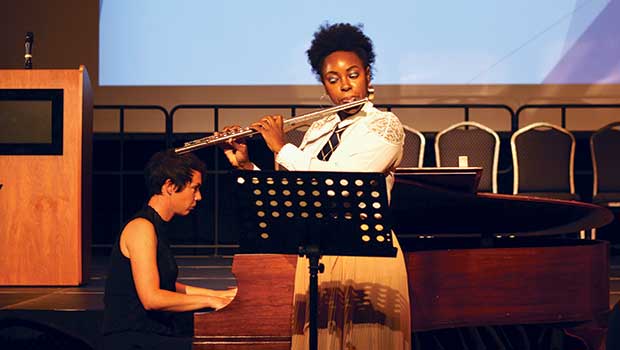
On August 16, Adrienne Baker, Seychelle Dunn-Corbin, Gina Razon and Christina Spurling took the stage at Hibernian Hall to celebrate black female composers. The “Women’s Equity Project,” supported by MassNOW, was testament both to the rich history of diverse female music-makers and the contemporary female musicians who carry on the legacy.

Alto saxophonist Seychelle Dunn-Corbin.
On the Web
For more information about the “Women’s Equity Project,” visit: www.massnow.org
Organized by Boston-based chamber group The NorthStar Duo and community organizer Zahra Ohldin, the evening featured seven musical pieces and an interactive panel discussion about the gender pay gap and feminist advocacy.
They were funded in part by the Feminism in Action Grant awarded by the National Organization for Women.
In their research, Ohldin and Baker found that, according to the League of American Orchestras, 4 percent of their musicians were black or Latino in 2015. They built the set list around lesser-known female artists. The one exception to this criterion was the opening number, “Lift Every Voice and Sing” by James Weldon Johnson, the famed author, songwriter and civil rights activist. The performers and entire audience sang the stirring anthem in unison.
“Afro-American Suite,” composed by Undine Moore Smith and performed by Spurling, Baker and Dunn-Corbin, was one of the strongest performances of the night, reaching a true harmony among instruments and artists. The piece flowed back and forth, from solemn and reverential to triumphant. The four movements are based on traditional Negro spirituals but Smith supplied them with a contemporary lens. Like the fight for equality, there are ups and downs, but unity in purpose is essential.
Undine Moore Smith wrote more than 100 compositions in her lifetime. Her composing career began at Fisk University in 1924 where she studied piano with Alice M. Grass. She later taught piano, organ and music theory at Virginia State College where she co-founded the Black Music Center.
The performers surprised the audience with two off-the-program selections by contemporary jazz pianist Valerie Capers. Though written for solo piano, they were adapted for piano and flute for this performance. “Bossa Brasilia” mixed traditional rhythms with a Latin flare while “Billie’s Song” had a softer, slower charm. Capers has been blind for most of her life and was the first blind graduate of the Julliard School.
The event shed light on an important dimension of the fight for equality, which is racial and ethnic equality in the arts. Particularly within traditional concert and orchestra settings, these groups often are pushed aside. The “Women’s Equity Project” reminded the audience of the many important challenges that lie ahead.






